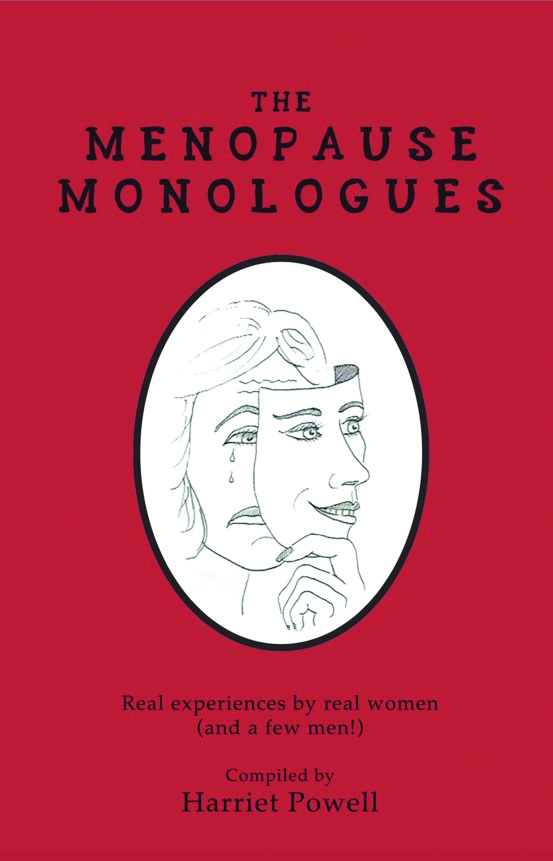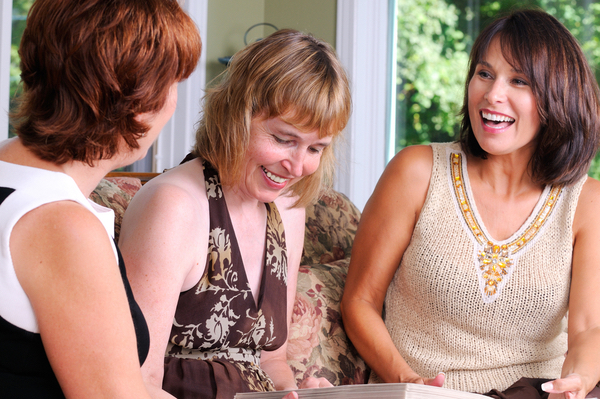 Harriet Powell, 49, a classical singer and author of The Menopause Monologues shares her experiences, plus those of others, for World Menopause Day this month.
Harriet Powell, 49, a classical singer and author of The Menopause Monologues shares her experiences, plus those of others, for World Menopause Day this month.
I was finishing a creative writing class with 30 boys from Year 10 when it happened: a massive and totally unexpected bleed through my light blue trousers.
It was the first of several horrible flooding experiences that characterised my perimenopause, along with hot flushes, rollercoaster mood swings and acid reflux, which made me terrified to stand up as a soloist and sing. But I soldiered on. No one talked about the menopause, did they?
One day I was driving to an event and Woman’s Hour came on the radio. It was Menopause Week and the phone-lines were jammed with women desperate to share their experiences.
I began to email friends for their stories. I even asked a few men. When I read my husband’s account, I cried. I simply didn’t recognise myself.
Not all doctors get it right
And so The Menopause Monologues was born, containing case studies of lots of women and their experiences of navigating this time in life. It’s shown me that not all doctors get it right. Some seem not to understand the symptoms; some prescribe antidepressants when HRT might have been more appropriate; some lack empathy.
It’s also clear that among the many ways of coping – exercise, yoga, mindfulness, diet, HRT – communication is key. A whopping 60 per cent of the contributors to the book said that talking, whether to a partner, friend or GP, was a surefire way of getting through.
Personal choice
I chose not to go down the medical route but it’s all about personal choice. Do your research. Go to a sympathetic GP. Ask questions. If you think you’re not getting good advice, ask to be referred to a specialist. Do what feels right for you.
Here are some of the women’s stories that Harriet gathered for her book…
‘Sex was so painful’
My menopausal symptoms crept up on me over a few years. Sex started to become painful and the skin in and around my vagina had become so sensitive that simply wiping myself after going to the toilet caused the skin to bleed.
My GP prescribed lubricants and a hormone cream. The products helped while I was using them but as soon as I stopped, the symptoms returned. So then she suggested HRT.
She said I wouldn’t be able to use any topical creams while taking HRT (this turned out to be wrong). The painful sex got worse. I was in tears almost every time I went to the toilet.
It was at this point I read about a famous menopause specialist. I made an appointment to see her privately. She said I had one of the worst cases of atrophic vaginitis she had seen and was appalled at the advice I’d received.
The cream I’d got at my first GP appointment had so little hormone in it that using it for a year would be the equivalent of taking one HRT tablet.
She gave me a stronger cream and another hormone treatment, plus natural vaginal moisturisers. Six months later everything had healed. I’m angry at how little my GP was able to help.
Clare.
‘I felt suicidal’
In my mid-40s I started having irregular periods and mood changes – I would cry for no reason.
There were no hot flushes or night sweats, but what came completely and utterly out of the blue was full-blown, devastating, suicidal depression.
The hormonal imbalance knocked me for six. I honestly don’t think I’d be here writing this had it not been for the total support of my GP and other local health professionals, plus SSRI medication.
It upsets me to think that those years of struggle also coincided with my daughter’s time at high school. Just the other week I found a note from her, written when she was 11 or 12. It read: “Mummy, please be happy. Turn your frown into a smile.”
It was hard to face the truth: that the menopause really had turned me into a different person.
Luckily, things have settled down now quite a bit, though without continuous medication and the regular practice of yoga, meditation and mindfulness, I’d be nowhere.
Abigail
‘HRT turned me into a she-devil!’
At 39, I started experiencing hot flushes. It took a while to suss out that these might be linked to the menopause: after all, I had only recently suffered a miscarriage. I assumed that my ovaries were functioning.
I resisted HRT for a couple of years but the GP appealed to my vanity, explaining it would help stave off dry skin and brittle hair.
The flushes disappeared and with them, the night sweats. The downside was that it put me back into a regular menstrual cycle. The only upside of the perimenopause had been that periods arrived once or twice a year.
If I stayed on HRT, how on earth would I know when I had finally gone through the menopause? Apparently you have to guess.
After two years, the doctor suggested I move onto a different variety. Whereas before, the HRT had given me oestrogen through the whole month and then progesterone towards the end of it, this new prescription would drip-feed me both. I shouldn’t have any bleeds.
It sounded good but it wasn’t. I was a she-devil all the time. So I went cold turkey.
What I really want now is to find someone who can tailor some bio-identical hormones to me.
My GP knew nothing about this but I have spoken to one or two people who do. No one yet has been able to take the necessary blood samples and prescribe accordingly. But I think this is the way forward.
Mo.
‘My skin broke out in cysts’
The first sign that I had started the perimenopause was the unwelcome appearance of small blistery spots in the creases by my nostrils.
My doctor prescribed a gel for rosacea, which worked for a few years. However, the skin on my face got a lot worse: soon I was getting blistery spots all over it. I never used to wear foundation, but it became an absolute necessity.
I also started getting cysts on my labia, usually before a period was due. The obstetrician I saw didn’t immediately recognise this as a symptom of perimenopause. Thankfully, I never got as far as needing surgery.
I investigated ways of balancing hormones through diet, which led me to try bread with various seeds in it, including pumpkin, sesame, sunflower and linseed. I have also turned to soya milk. And I now moisturise all over every day, which has reduced the itching.
Deborah
6 things to consider before seeing your GP
Harriet has the following advice for anyone thinking of seeking help from their doctor.
1 Don’t be fobbed off with anti-depressants. Some GPs are still failing to distinguish between hormone-related mood swings and more general depression.
2 Don’t be afraid to question HRT dosage. If you don’t feel it’s working, don’t be afraid to say so. It might take several goes before you get it right.
3 Know that menopause can have unusual symptoms. Most women can identify hot flushes as a sign of menopause but even specialists don’t always diagnose the less common symptoms such as vaginal cysts and acne.
4 If you feel happier talking to a female doctor, that’s OK. If you don’t like discussing vaginal dryness or lost libido with a man, request a female colleague or find a Well Woman clinic.
5 Don’t rule out going privately. Some effective products aren’t available on the NHS, such as custom-made bio-identical hormone creams and testosterone. Private doctors are also more likely to take regular blood samples to check how HRT is working for you.
6 Medication isn’t always the solution. Many women find the answers to their problems outside of the GP surgery. Around 20 per cent of women featured in The Menopause Monologues said an over-the-counter, water-based lubricant such as Sylk had transformed their sex lives, while others were helped by herbal remedies, diet, exercise and meditation.
 The Menopause Monologues (£7.99, The Little Taboo Press), is available from bookshops and on Amazon.
The Menopause Monologues (£7.99, The Little Taboo Press), is available from bookshops and on Amazon.








